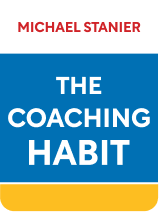

This article is an excerpt from the Shortform book guide to "The Coaching Habit" by Michael Bungay Stanier. Shortform has the world's best summaries and analyses of books you should be reading.
Like this article? Sign up for a free trial here .
What are some powerful coaching questions? How can you help your employees in a big way simply by asking the right questions?
As a manager, you want to help your team members think strategically, make better decisions, learn new skills, and grow in their work. You can do all of this simply by asking two powerful coaching questions: the strategic question and the learning question.
Keep reading to learn how to ask these powerful coaching questions.
Powerful Coaching Questions You Should Ask
You can help your team members improve greatly simply by making a habit of asking them two powerful coaching questions. The first is the strategic question: “What’s the cost of saying ‘yes’?” This helps employees think through their options and make better decisions. The second is the learning question: “What insights did you gain?” This helps employees learn new skills and grow in their work.
The Strategic Question: “What’s the Cost of Saying ‘Yes’?”
In a fast-moving, highly competitive work environment, employees are often asked to take on more and more tasks, even when their plates are already overflowing. For example, they’re asked to sit in at a meeting, to join a committee, or to take part in out-of-office activities on top of their existing responsibilities. Despite being overloaded, they tend to say “yes” to more tasks because they associate being busy with being successful, and it’s often hard or awkward to say “no.”
When you see team members contemplating an opportunity or additional responsibilities, you can help them make the best decision by asking them this question: “What’s the cost of saying ‘yes’?” As with all powerful coaching questions, you want to make this a habit.
Why This Question Is a Good Coaching Habit
According to psychologists, two factors lead to poor choices when it comes to deciding whether or not to take on new tasks. First, people believe they can do more than is actually possible. Second, people tend to overvalue what they have.
In the workplace, these two factors show up as team members who are overwhelmed because they don’t have a realistic understanding of the commitment needed for all the new tasks coming their way, and they’re unwilling to let go of anything they’re already doing.
Asking powerful coaching questions such as, “What’s the cost of saying ‘yes’?” leads a person to evaluate and be realistic about the time, energy, and resources he’ll need to expend to accomplish a task. It also leads him to reflect on the value of his pre-existing tasks, and whether he’s willing to sacrifice them to fully commit to another task.
(Shortform note: Read our guide to Daniel Kahneman’s Thinking, Fast and Slow to learn more about the psychological phenomena directing our decision-making.)
How to Make It a Habit
Asking powerful coaching questions should be part of your routine. A team member who’s considering taking on additional tasks should trigger you to ask, “What’s the cost of saying ‘yes’?” Then, you can guide him to make an informed decision with two further steps:
1) Ask Him to Reflect On the 3Ps
Have him outline the projects he’ll need to give up to take on this new responsibility, the people who will be affected by his decision, and the patterns and behaviors he’ll need to overcome to accomplish the new task.
2) Give Him the Tools to Say No
Explain that there are two ways to turn down new opportunities that make the process a bit easier.
1) The “slow yes”: In response to the offer of a new task, he should ask questions that give a clearer picture of the commitment required, such as, “What’s the timetable?” and, “If I can only commit x hours, what would you like me to do?” Such questions will lead to one of four outcomes:
- He finds out that he doesn’t have a choice and has to do it anyway
- He gets some illuminating answers that will better help him make a decision
- He buys himself some time to think about it
- He’s left alone and someone else is asked to do the job.
2) The “diplomatic no”: Make saying no less awkward by refusing the task rather than the person. For example, you might say, “It looks like I have to say no to this project” instead of, “It looks like I’ll have to say no to you.”
The Learning Question: “What Insights Did You Gain?”
As a manager, it’s part of your job to help your direct reports learn new skills and become better, more successful workers. Projects and problems present many teaching moments, but the lessons from those experiences may not always stick. The best way to help your team members absorb new information is by asking this question: “What insights did you gain?” As with all powerful coaching questions, you want to make this a habit.
Why This Question Is a Good Coaching Habit
“What insights did you gain?” not only encourages your team members to identify and retain a concrete lesson they learned, but also makes them feel like you care about them. As a bonus, their answers can clue you in on how to better coach them in the future.
There are three science-backed reasons why asking, “What insights did you gain?” leads to increased learning:
1) Double-Loop Learning
Single-loop learning is solving a problem outright. Double-loop learning, according to business theorist Chris Argyris, is where we learn best—this involves questioning the procedure and goals underlying issues you’re trying to solve.
- For example, single-loop learning might look like stopping a marketing campaign that doesn’t seem to be working. Double-loop learning might look like why the campaign isn’t working—is it targeting the wrong demographic? Is it succeeding in unexpected areas and failing in expected areas?—and adjusting accordingly.
Asking your team members, “What insights did you gain?” prompts double-loop learning as they reflect on the issue and question their approach to it.
2) Memory Retention
Psychologists have found that when we learn something, we immediately start to forget it. Asking, “What insights did you gain?” stops the process of forgetting.
(Shortform note: Read our guide to Make It Stick to learn more about this psychological phenomenon and get more memory-retention strategies.)
3) The Peak-End Rule
The peak-end rule states that when people recall an event, they tend to remember the emotional peaks and the end. Therefore, if an experience ends on a high note, people will recall it more positively.
- For example, you organize a meeting that’s overall very dull. However, during the last five minutes, you do a fun, informal “awards ceremony.” The attendees recall the meeting as an overall fun experience.
Asking, “What was most useful for you?” at the end of a conversation means that the experience will end with the team member thinking about the most useful parts of the conversation. According to the peak-end rule, this will cause him to recall the entire conversation as a useful and positive experience.
How to Make It a Habit
Asking powerful coaching questions should be part of your routine. Instead of rushing your team member off at the end of a coaching session, finish strong by asking, “What insights did you gain?” This gives your team members the chance to reflect on the important information they picked up and is an elegant way to signal the end of the conversation.
Additionally, share what insights you gained. Being a manager doesn’t mean your learning has stopped. Sharing your perspective and insights reinforces the idea that your coaching conversations aren’t one-sided.
Making a habit of asking these two powerful coaching questions can make a huge difference for your team.

———End of Preview———
Like what you just read? Read the rest of the world's best book summary and analysis of Michael Bungay Stanier's "The Coaching Habit" at Shortform .
Here's what you'll find in our full The Coaching Habit summary :
- How to turn coaching into an informal, effective daily habit
- Why you should practice listening instead of speaking for 10 minutes a day
- The seven essential questions to ask your team members






